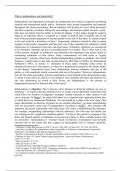What is independence and impartiality?
Independence and impartiality principles are fundamental and widely recognised constituting
national and transnational public policy. Arbitrators must remain independent and impartial
throughout the whole proceedings. But an arbitrator will develop his views about the parties
and their respective positions during the proceedings, and become partial towards a party.
This does not detract from his ability to decide the dispute. ‘[A]ny judge, though he ought to
begin in an impartial stance, is required as a matter of judicial duty eventually and on the
basis of the presented arguments to become partial to one side or the other. To remain neutral
to the end would be a dereliction of duty’ 1. Importantly, arbitrators should be able to remain
receptive to the parties’ arguments until the end, even if they contradict the arbitrators’ initial
impressions or evaluations of the facts and legal issues. Ultimately, arbitrators are unexpected
to be absolutely impartial and have no predispositions on a matter. This is often seen as one
of the primary strengths of arbitration and underlines the importance that parties attach to
nominating arbitrators of their choice. Many commentators see both terms as ‘legally
synonymous’2, whereas others have labelled distinguishing attempts as pedantic, but Lutrell
disagrees. Lutrell believes that both overlap based on IBA Rules of Ethics for International
Arbitrators (1987), as Article 3.1 (Elements of Bias) states ‘Partiality arises where an
arbitrator favours one of the parties, or where he is prejudiced in relation to the subject matter
of the dispute. Dependence arises from relationships between arbitrator and one of the
parties, or with somebody closely connected with one of the parties.’ However, independence
lasts for the entire proceeding, whereas impartiality is more limited in the chronological sense
in which it must end if an award is to be rendered. Also, partiality develops and increases for
one side culminating an award in their favour, but independence is ‘the absence of
inappropriate personal or financial links with a party’3.
Independence is objective. This is because ‘prior business or financial relations are easy to
determine’4. It requires that the arbitrator have no actual or past dependent connections that
could affect his freedom of judgment. Examples include financial or other interest in the
case’s outcome. In Dimes5, the judge held shares in a corporate party appearing before him,
in which there was commercial familiarity. No one should be a judge in his own cause 6, thus
major shareholders or directors of parties are not suitable arbitrators, yet minor shareholdings
may not necessarily create lack of independence according to AT&T7. Also, persons with
important and actual relationship with either party will count as disqualifying the arbitrator.
For example, longstanding relationships with the arbitrator’s law firm may cast doubts, but
not working on few completely unrelated matters8. Yet due to the growth or merging of law
firms and limited number of arbitrators, it becomes less likely to find a suitable person with
no connection9. Independence is ‘external’ based on objective circumstances and normally
relevant only to the extent that they suggest an unacceptable risk of ‘internal’ partiality.
1
Challenge of Judge Bengt Broms in IUSCT Case of 7 May 2001, 38 Iran-US C.T.R. 386, 394 (2010)
2
Lord Steyn, ‘England: The Independence and/or Impartiality of Arbitrators in International Commercial
Arbitration’, ICC Bulletin 2007 (Special Supplement), 95.
3
Decision of Appointing Authority to the Iran-United States Claims Tribunal (7 May 2001) at 5–6, in
‘Challenge of Iran-U.S. Claims Tribunal Judge Bengt Broms’, American Journal of International
Law95, no. 9, 380.
4
Ebner per Kirby J at 55, 83.
5
Ebner per Kirby J at 449.
6
Locabail (UK) Ltd v Bayfields Properties [2000] 1 All ER 65
7
Court of Appeal, 15 May 2000, AT&T Corporation and another v Saudi Cable [2000] 2 Lloyd's Rep 127
8
Craig Park Paulsson, ICC Arbitration, para 13-05(v).
9
Lew, Mistelis & Kröll, Comparative International Commercial Arbitration (Kluwer Law International 2003),
page 262.




